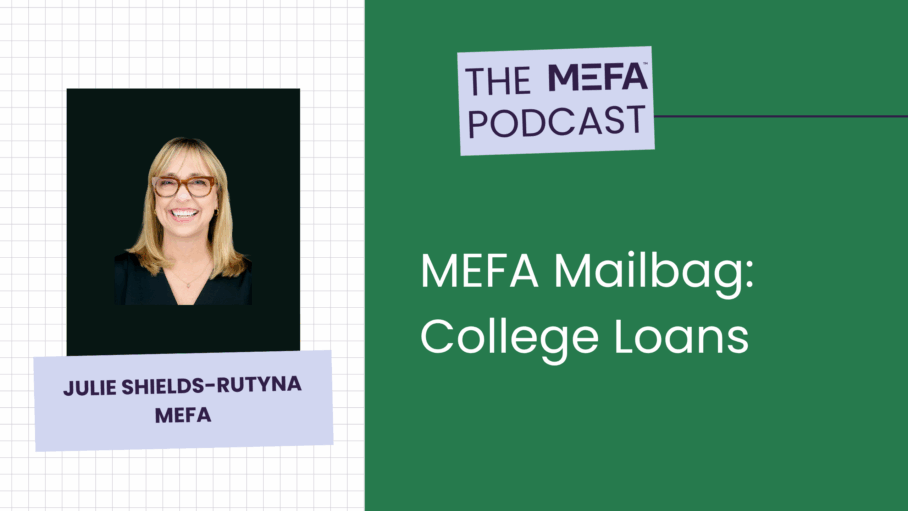Resources Mentioned in this Episode
Julie Shields-Rutyna: [00:00:00] Yeah, the marketing is out there as low as, and it’s really important to not just look at that as low as, because that is someone who has perfect credit and probably borrows a certain type of. Loan. But here’s what’s really important and why. I guess why I am so high on methyl loans is that spread again is 3.29 to 8.89. So that means that the highest interest rate that someone is going to have borrowing a MEFA Loan is 8.89 the very highest.
And we know that there are other lenders out there. Who have much larger spreads, loans up in the very high interest rates, so they might even have a teaser rate at 3%.
[00:01:00] But then the loans go all the way up to, I, I don’t want, I’m just making it up, but 17, 18, whatever percent big spreads. So it’s important that families understand.
Jonathan Hughes: Hello and welcome to the MEFA Podcast. My name is Jonathan Hughes.
Julie Shields-Rutyna: And I’m Julie Shields-Rutyna.
Jonathan Hughes: Didn’t miss a beat, Julie.
Julie Shields-Rutyna: Nope. Yes, that’s right.
Jonathan Hughes: Julie is back. How are you? Julie, how have you been?
Julie Shields-Rutyna: I’ve been great. And happy to be back on the podcast.
Jonathan Hughes: The reason that we have Julie on, other than the obvious, but the topic that we are going to have Julie discuss. Is loans, right? And to answer customer questions about borrowing loans for college, because we are in the thick of it, so to speak.
We’re recording this just after the 4th of July holiday. This is when we’re getting a lot of questions from parents about borrowing loans for the upcoming year. So Julie, maybe you can just situate us here in the timeline. Where are most parents of incoming [00:02:00] college students or the students themselves right now in this process? What’s going on with them?
Julie Shields-Rutyna: Yes. For the most part, students chose a college on May 1st, which was National Decision Day, and probably put a deposit down, and then maybe they went through graduation and other things associated with graduating high school that maybe they’ve attended an orientation at their college or an accepted student day, things like that.
But other than that, they probably. Have, not been dealing with too many details of what’s going to happen in the fall. But now this is the time when colleges send out bills. So colleges usually send out bills in either June and then they’re due in July. Or in July, and they’re due August. So I think many families we know have received their college bill. Now, if you haven’t received your college bill, it’s probably a good idea just to reach out to the college and ask about [00:03:00] timing on that.
Jonathan Hughes: Alright, so thank you for that. That brings us to our first mailbag question, but before we get to it, I want to remind everybody that these questions are real questions that have come into us over the past few weeks by real customers, and that if you have any questions, you can contact any one of MEFA’s college guidance experts over email at [email protected] over the phone at 800-449-MEFA, or on Facebook at @MEFAMa on X at @MEFATweets and on Instagram at @MEFA_Ma. Let’s go to our first question, and that’s from Dawn who writes.
“What is the timeframe, the probably the most popular question I get when I’m talking to customers around this time of year every year. Am I behind? Am I behind the eight ball?”
Julie Shields-Rutyna: And the answer is no. I think right now is peak time where this process is beginning and in, in process. Nope. You are, you’re thinking about this at exactly the right time.
I’ll just mention that [00:04:00] families, if they have federal student loans in a financial aid offer. We always say those are the first loans that they should take advantage of because they have specific terms and benefits for students, and those are loans for the students. So I’ll just mention that upfront.
But many times since that’s not enough to cover the full bill, families then look to other. Loans. And so then that happens right about now. They family receives a bill, sees how much they need to pay, what the balance is after any financial aid has been deducted from the bill and, they apply for a loan and once they apply for a loan and it’s approved the loan organization, I’m speaking of how Mefa does things, but I know other loans work the same way. The, then the loan organization, company goes to the college and needs the loan to be certified. They just, they really need the college to say, yes, this student will be attending in the [00:05:00] fall.
And once that happens the college knows that loan is in process, which is key. They know that money is coming and then the loan can be dispersed.
Jonathan Hughes: So from start to finish. From starting the application online to the college, getting the funds, how long does that take?
Julie Shields-Rutyna: If a family completes the application accurately has everything? It can actually, they can receive an approval and the college can certify and the loan can be dispersed sometimes. Within a week. That can happen. However, we really ask families to allow at least two weeks, maybe three, to make sure. That’s why we ask families to start this process now.
Yeah. Even if the loan isn’t the bill isn’t duped until August. Start it now. So you’re not rushing all of that. Even though it can happen really fast sometimes [00:06:00] there’s a piece of information that needs to be. Followed up on or something like that, or disbursements happen on a certain day and.
You just missed that day and you have to wait a week. So just give it a couple of weeks. Yeah. Two to three weeks I would say, if you can.
Jonathan Hughes: Now let’s go on to question number two, and this one is from a one-on-one appointment that I did, Nancy wanted to know what me a’s interest rates are and how do they compare with other lenders. So what do we want to say about interest rates in general as far as educational loans are concerned? And then, what’s the environment now and where’s MEFA?
Julie Shields-Rutyna: Yes. I guess I, I love getting this question today, John, because mi a’s interest rates are great. So right now this, for this coming year, mi a’s interest rates range from 3.29 to 8.89 a PR.
Okay? The thing about that is [00:07:00] interest rates are based on, mainly based on a credit score and also based on the type of loan that a family borrows. So we’ll get to that. So those two, two pieces together are what determine what interest rate a family will receive. And so again, beginning at 3.29.
Is really low starting rate. But depending on credit score and the type of loan, it could go all the way up to 8.89. One loan that colleges always let students know about right away is the Parent plus loan. Okay. So that’s a federal loan for parents to borrow to help the students.
Jonathan Hughes: And this is different than the federal loans for students, right?
Let’s make that line obvious right now. So when we were talking about the federal loans earlier, that you should take those first. This is not that, right?
Julie Shields-Rutyna: Exactly. So this is parent [00:08:00] loan undergraduate students. PLUS. For parents, and because it’s federal, the colleges just let parents know about that loan. But it’s worth noting that this year that parent plus loan has an interest rate of fixed 8.94. So that number is. Is above that spread that I just mentioned for what MEFA loans can be.
Jonathan Hughes: Yeah.
Julie Shields-Rutyna: So worth noting. And also, the Federal Plus loan has a fee that’s 4.22% of the loan. So really if you combine the plus loan interest rate and that 4.2% fee, that APR is a lot higher than any loan a family would get from MEFA.
Jonathan Hughes: Now, can we talk about rates and spreads and whatnot? And what is something that folks should look at? Because a lot of lenders will say rates as low as, right?
Julie Shields-Rutyna: Yes. [00:09:00] And so let me talk about the way it works at MEFA and then we can mention the other lenders too. But yes. Yeah, the marketing is out there as low as, and it’s really important. To not just look at that as low as, because that is someone who has perfect credit and probably borrows a certain type of loan. So for example, MEFA offers a number of different types of loans. And one is that a loan, it’s called immediate repay 10 year.
And that just means that a family would start repaying that loan. After the second disbursement during freshman year, so probably in February, January of February freshman year, the family would start paying on that loan and then pay it for 10 years. There’s also immediate repay for 15 years. Then there’s an option, pay interest only for 15, and then while the student is in school and then pay more [00:10:00] later that’s also for 15 years. And then there’s even an option for some families to defer while the student is in college and pay it all afterwards. And a final option where if the family would like to be formally and legally removed.
As a co borrower, they can do that. But in the exact order that I described it interest rates go up a little bit with each option there. So in other words, someone with really good credit, taking a 10 year immediate repay loan is going to get, one of the low, the lowest interest rate, and it goes up slightly from there.
So it’s really credit and type of loan that determine that. And so other lenders probably have similar options and scales and things like that. But here’s what’s really important and why, I guess why I am so high on MEFA loans is that spread again is [00:11:00] 3.29. To 8.89. So that means that the highest interest rate that someone is going to have borrowing a methyl loan is 8.89 the very highest.
And we know that there are other lenders out there who have much larger spreads, loans up in the very high interest rates. So they might even have a teaser rate at 3%, but then. The loans go all the way up to, I don’t want, I’m just making it up, but 17, 18, whatever percent big spreads.
So it’s important that families understand and they can try to apply for a loan with a great teaser rate, but make sure that they know. What rate they’re actually getting, because these differences make a huge difference in the amount of money that one pays back.
Jonathan Hughes: Building off that question, I know that this is something that I’ve been getting a lot this year, and this is a question that [00:12:00] Jennifer has written to us.
“Many people say to shop around for student loans, so how does one actually shop around for rates? What does this process look like? Do I need to apply to each loan provider? Is that a credit? A hard credit pull that’s going to affect my credit score. How do we do that?”
Julie Shields-Rutyna: When we say shop for loans I’d say there’s two levels. There’s the level of window shopping, just seeing what’s out there, and then there’s the level of actually shopping, trying out the, could I get this loan? Could I get that loan applying to them? So starting with the window shopping colleges will sometimes have a lender list. So you could look at the lender list that they provide and look at the different loans that are options for families.
Or, you’ll know about plus now you know about MEFA. You might know about other banks in the area that have educational loans. That’s also window shopping, just looking at the different interest rates and terms. [00:13:00] But then. If you really want to find the best loan for you as a family, you will actually have to make an application.
So you’ll have to apply. So maybe you find two or three loans that look decent and look like good options for you. You can actually apply to those loans and get. An approval back and see what actual interest rate a PR terms that they give you, and then you can decide, oh, okay, I, this loan is the best for me.
And if you apply to a number of educational loans, so all the same type of loan, this sometimes applies to car loans or mortgages too. If you apply to all of those loans. At the same time it actually can be anywhere between 14 and 45 days, but I’d say to be conservative 14 days in the same two weeks.
If you apply to two or [00:14:00] three educational loans, then even though some of those might be hard pulls, some might be soft pulls on your credit. The credit bureaus, look at the fact that you’re applying to the same type of loan in a finite period of time, and consider that one hard pull on your credit rather than three or four or five or however many you do.
So the key is, I. If you’re going to make these applications, do them all at the same time, which is also helpful because then you get the answers back at the same time and you can make a decision on what loan to borrow.
Jonathan Hughes: As should mentioned that MEFA offers a comparing college loans webinar, the recording of which is on mifa.org, and we can link to that recording in the show notes for anyone who wants more detail on this and other questions where we really go through.
Things that you want to know about different types of loans and how you can compare them. And, speaking of different programs as you were speaking of before, whether it’s immediate [00:15:00] repay loan or a deferred loan or an interest only repayment loan we got a question from some from Patty who asks, “why would I want a loan that begins repayment while the student is in college?” That’s a good question.
Julie Shields-Rutyna: That is a great question and actually, every family is different. So one reason you might choose an immediate repay loan is that through MEFA that actually does have the potential of having a lower interest rate. And I’ve seen families who. Maybe they’ve sat down at the kitchen table with their student and they’ve worked out who’s going to pay what, and maybe some have said, we’ll help you while you’re in college, and then when you graduate and get a job, we expect that you are going to start paying on that loan, but we’ll help. And in the case where parents have made a decision that they’re going to help the student with a certain amount of that loan, maybe all of it, maybe none of it, maybe some, [00:16:00] then they might say I’m going to get the immediate repay loan so we can pay it as we go along.
So that, no. No interest is accruing and getting added to the loan. And then once the student graduates, they can take that over. I actually see a lot of families make that choice if they’ve decided to help with a part of that loan repayment.
Jonathan Hughes: Yeah. And it’s cheaper right in the long run to do the immediate. Is that right? And that-
Julie Shields-Rutyna: Is this a good place to talk about our calculator? Yes. Have an undergraduate loan payment calculator. It’s so great because you can type in, and this is even before you apply, you can type in, we want to borrow $15,000 and my. Son or daughter has four years left, has four years to go with college and our credit is excellent.
And up pops a chart which just shows all [00:17:00] the different options and what the interest rate would be. And, what, how much you would pay overall if you paid it out over the course of the repayment term. All of that, what the monthly payment would be. And for some of those options that are pay interest while in college and it jumps up after the student graduates, you can see what’s the in college payment, what’s the out of college payment.
It’s a really good chart, I think, to get a good sense of making a choice.
Jonathan Hughes: Yeah, and actually it ties in perfectly with the next question that we have, which is from. Beth who wrote that, “my daughter is applying for a loan this academic year and we know the full amount after the 10 year repayment period.”
So it sounds like they’re, thinking about getting that 10 year immediate repay loan when that shows you on that calculator. Seems like they’ve gone to it and they know how much they’re going to pay back over 10 years, like what they borrowed plus the interest total. So she goes on to say, my question is.
[00:18:00] If we were to pay more than the monthly payments and pay the loan off early, are we still held to that full repayment amount? I think what she means is, are we still going to pay that amount? Everything that I borrowed plus the interest over 10 years that it’s estimated on that calculator.
Julie Shields-Rutyna: Absolutely not. So the good thing about these loans is there are no repayment penalties. Prepayment penalties, I meant to say prepayment penalties. So if you pay any of these loans off early, you will save on all of that extra interest that you would’ve paid over future year. So absolutely, the faster you pay off these loans, the less you’ll pay overall.
Jonathan Hughes: That leads us to another question. So two related questions actually. So Robert asks, “does having loans for year one affect the ability to borrow for subsequent years?” This was in a presentation that we did. He was asking [00:19:00] questions in the chat. I don’t actually know if he’s referring to federal loans or MEFA loan.
So why don’t we do both? Do you have to take those federal loans? First, the federal student loans, the ones that are financial aid. If you choose not to take those, even though we recommend that you should, if you’re going to be borrowing anything can you still get them? If you’re able to pay out of pocket first year, does that and you don’t need them?
Does that have any kind of effect on your ability to borrow for subsequent years? And then number two, for MEFA loans, let’s say a different question. Okay? That is. If you start off taking one of those immediate repay loans, do you have to continue with that same loan option next year, or can you go for a deferred loan, et cetera. That’s also another question that I’ve been getting.
Julie Shields-Rutyna: Great. So let’s just take the federal loan piece. No you apply for financial aid each year. If for some reason you decide the first year you don’t want to take the federal loans they will still be offered to you the second year. [00:20:00] So what you do one year does not affect what you’ll be eligible for the next year.
I’ll just make to make a point, which is that there are maximum federal loan limits for those student federal student loans. So you can never go back and get that amount that you would’ve gotten freshman year, but what you do one year does not affect subsequent years on your federal student loans now.
So changing topic, let’s talk about MEFA loans. Yes. If you borrow a loan one year, is that going to affect your ability to borrow in future years? And the key is, let’s go back to the beginning. Your eligibility for a MFEA loan is mainly based on your credit score. And a little bit about the loan you’re choosing, but mainly your credit score.
So as long as your credit score stays. Good. And in the eligible range to borrow, you will be able to borrow. [00:21:00] And, whilst having more debt does have an effect on your credit sometimes paying back the debt and being in good standing with that debt has, an even. Greater effect on your credit.
So the key is just making sure that you keep your credit in good standing. And then as long as your credit is in good standing. Then your ability to borrow a MEFA loan wouldn’t be affected from year to year.
Jonathan Hughes: That’s a great answer. And then just in terms of programs, if you take your immediate repay 10 year loan for your freshman year, you don’t have to pick that loan for your next year. If you’re accredited, approved for a deferred loan, you could take that.
Julie Shields-Rutyna: Exactly, so each year you are presented with options and each year you can choose an option. So you might have different MEFA loans each year. And we see that with, that person who asked you ” why would someone want to pay during college?”
And they might [00:22:00] choose an immediate repay loan because they might be able to afford that the first year, but maybe they wouldn’t be able to afford doing that for four years. So they might. Choose a different option as the years go on.
Jonathan Hughes: Another question from Jennifer, “does MEFA have a total maximum loan amount?” You mentioned that the federal loans do, or the federal student loans do, does MEFA and-
Julie Shields-Rutyna: MEFA does not have a maximum amount. So if you’re trying to plan, you probably can estimate that. Whatever you’re going to need. To pay that freshman year bill you’re probably going to need a similar amount. Things change in families, and that’s not a hundred percent true, but in general, for planning purposes, you can probably estimate you might need to borrow the same amount in coming years.
Jonathan Hughes: Finally here, our last question is from Hannah who says “I’m [00:23:00] considering taking out an undergraduate school loan, but I’m planning to continue to graduate school is full payment of the loan deferred for graduate school?” Great question.
Julie Shields-Rutyna: Yeah. So when we’re talking about federal direct student loans those loans can be deferred. Those student loans can be deferred for graduate school. Be aware that some have interest that subsidized while the student is in school and some don’t. Some have unsubsidized, so if a student has unsubsidized, they can defer that, but that interest. Is still accruing if it’s unsubsidized. So that’s for federal loans, for private loans.
There, there really isn’t a deferment. Because though your loans, once you graduate, six months later they come due. And there isn’t necessarily a [00:24:00] deferment for grad school. So you really have to think about planning for that.
Jonathan Hughes: Julie, is there anything else that you think people should know?
Julie Shields-Rutyna: So I, yes, I just asked a few people who’ve been answering a lot of phone calls lately. And another big question is people ask, do I borrow the loan for the whole year or semester by semester?
Jonathan Hughes: Yeah, that’s a good one.
Julie Shields-Rutyna: And so our answer is, it’s easiest and if you can just makes it simpler. Just borrow the loan for the whole year and then it gets dispersed half in the fall, half in the spring.
And also that you need to borrow every year. You don’t borrow for the four years, I think. I think those were the two. Two. Yeah.
Jonathan Hughes: Okay. That was the MEFA Mailbag. So remember, you can reach out to us with any questions you may have on planning, saving, and paying for college and career readiness via email at [email protected]. Over the phone at 800-449-MEFA, on Facebook that’s @MEFAMa at X @MEFATweets, on [00:25:00] Instagram, @MEFA_MA, remember, we have a bench of college guidance experts waiting to answer your questions. Julie, thank you so much for being back.
Julie Shields-Rutyna: Oh, very great to be here.
Jonathan Hughes: I hope to be on the show again soon.
Julie Shields-Rutyna: Yes. I thought it was, I It was pretty natural, don’t you think?
Jonathan Hughes: Yeah, I do. I do. Okay. Okay. Now, folks, if you liked that you’re hurt and you want to hear more from us on planning, saving, and paying for college career readiness then follow the show. And you can do that wherever you find your podcast. And please remember to review us. It helps us to keep doing what we’re doing and getting the show out to folks like you. I would like to thank our producer, Shaun Connolly. I’d like to thank Meredith Clement. Lauren, Danz, Lisa Rooney. AJ Yee and Christina Davidson for their assistance in getting the show posted. Once again, my name is Jonathan Hughes and this has been the MEFA Podcast. Thank [00:26:00] you.















